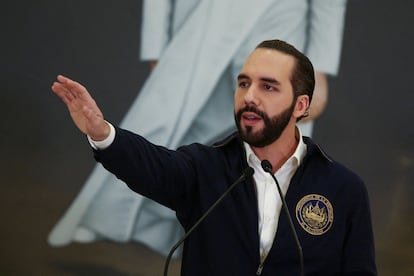El Salvador’s Bukele vs the world: Why the president’s re-election bid is sounding alarm bells
The 41-year-old may be the most popular leader in Latin America, but his decision to run for a second term has sparked concerns in the international community

Just a few hours after President Nayib Bukele announced that he would stand for re-election in El Salvador – a first in the country’s democratic history –, the leader posted a photo of himself kissing his wife in the Presidential Palace next to the national flag. Despite the gravity of the announcement, the photo on Twitter – Bukele’s main political forum principal – received more likes than the post of his speech announcing his intention to run for a second five-year term. It is an example of the leader’s ability to mix the personal and the private, a strategy that has worked well for him in El Salvador, but that has raised eyebrows abroad. Bukele has few friends in the internation community: the United States has criticized his government, Europe has distanced itself from him, and even other Latin American countries see him as something of an oddity. It’s perhaps for that reason that, when announcing on Thursday his intention to remain in power until 2029, he lashed out at the international community.
“After 201 years, we are finally living true independence. This has not been only thanks to the work of our government, but because we charted our own destiny and did not obey international dictates,” Bukele said in a speech broadcast on national radio and television. “They gave us 200 years of strategies, and they all failed. Now that we are starting to do well, there are some in the international community who condemn the actions for which we are doing well […] It’s certain that more than one developed country won’t agree with this decision. But they’re not the ones who get to decide. The people of El Salvador do.”
During his three years in power, Bukele has been met with national applause and international reproach. In El Salvador, while he was initially considered with some uncertainty, now he is a leader who does not need to meet with the people, kiss babies, go to debates, or give a single in-depth interview to maintain an 85% approval rating, the highest in the continent. But many countries such as the United States have started openly criticizing the 41-year-old former publicist.
In recent months, the US administration of President Joe Biden has sanctioned Bukele’s inner circle. The US government has also withdrawn visas and frozen assets of a dozen officials and former Bukele staffers for corruption and anti-democratic behavior. Last year, the United States Agency for International Development (USAID) suspended funding for the National Police, the Attorney General’s Office, the Supreme Court and the Institute for Access to Public Information. This decision was made after Bukele dismissed the judges in the Constitutional Chamber of the Supreme Court of Justice and appointed new members, who supported his plans to stand for re-election. USAID funding now goes to civil society groups and to independent media outlets – a move that has intensified Bukele’s criticism of the United States as well as American philanthropist George Soros, whom he accuses of financing the 2020 street protests. Last year, during El Salvador’s Independence Day celebrations, Bukele also attacked US diplomat Jean Manes, who had compared him to the late Venezuela leader Hugo Chávez. “To the countries that do not like what is happening in El Salvador, put up with it,” he said.
And it is not just the United States that has criticized Bukele. In May 2021, the president met with many ambassadors, who criticized the authoritarian drift of his government. The surprise came when they discovered that Bukele had recorded the meeting to broadcast it on a national TV network. When the Chilean ambassador protested, one of Bukele’s deputies, Walter Araujo, replied on social media: “A president does not have to ask an ambassador for permission,” “If you are used to the dark, that’s up to you. With right do you have to make demands? Don’t fuck around, dude.”
Bukele has also come under fire from economic organizations over his decision to make Bitcoin legal tender in one of the poorest countries in Latin America. When the cryptocurrency officially became a legal currency on September 7, 2021, it was trading at around $45,000. That figure has since plummeted to $20,000, which has negatively affected El Salvador’s credit rating and its relations with the International Monetary Fund (IMF), which has urged Bukele to reverse the decision.
Bukele’s relationship with NGOs has not been much better. After announcing his intention to run for a second term, Tamara Taraciuk, the president of Human Rights Watch, warned: “The future of El Salvador’s democracy is more at risk than ever, in the face of a decision that blatantly exemplifies the government’s authoritarian tendencies.” His wife and Salvadorans may have welcomed his reelection plans, but the international community considers it further proof of his intention to stay in power through illegitimate means.
Tu suscripción se está usando en otro dispositivo
¿Quieres añadir otro usuario a tu suscripción?
Si continúas leyendo en este dispositivo, no se podrá leer en el otro.
FlechaTu suscripción se está usando en otro dispositivo y solo puedes acceder a EL PAÍS desde un dispositivo a la vez.
Si quieres compartir tu cuenta, cambia tu suscripción a la modalidad Premium, así podrás añadir otro usuario. Cada uno accederá con su propia cuenta de email, lo que os permitirá personalizar vuestra experiencia en EL PAÍS.
¿Tienes una suscripción de empresa? Accede aquí para contratar más cuentas.
En el caso de no saber quién está usando tu cuenta, te recomendamos cambiar tu contraseña aquí.
Si decides continuar compartiendo tu cuenta, este mensaje se mostrará en tu dispositivo y en el de la otra persona que está usando tu cuenta de forma indefinida, afectando a tu experiencia de lectura. Puedes consultar aquí los términos y condiciones de la suscripción digital.









































